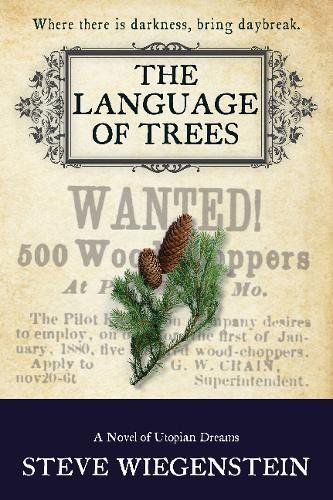“The Language of Trees” makes a trilogy out of the Daybreak series for author Steve Wiegenstein, an academic in Columbia, Mo.
Daybreak is the name of an idealistic commune in Missouri’s Ozarks. Wiegenstein began the series in 2012 with the founding of the commune back in 1855. The series continued in 2014 with “This Old War,” in which Daybreak suffers from the aftermath of the Civil War.
Now, in “The Language of Trees,” Daybreak faces yet another challenge — the arrival of a big Eastern lumber company seeking to enrich itself by stripping the forests of their tall and thick pine trees in the area.
Early in the book, a local talking to an outsider tells him about Daybreak, “its founding by a group of like-minded souls who believed in the common ownership of property, direct democracy, and a host of other social reforms. How the war had divided them, the neutrals from the war party, the Union men, like himself, who felt loyalty to a particular state. How they had patched things together after the war, but not without considerable friction and, sad to say, the loss of some of their people.”
Like the previous books, “Language” devotes each chapter to a separate character or small group. In addition to their problems with the big lumber company, which wants to buy their pine-rich land, the Daybreak residents must deal with problems among themselves. Those problems range from violent disputes to heated sexual activity, with damages to many a conscience.
Readers who missed the earlier books may find it hard at first to keep the characters straight. But as the tale winds on, the characters grow sharper in their unique ways — some good, some less so.
Wiegenstein grew up in the Ozarks, and his familiarity with the area and its ways gives the book an authentic feel. He writes about “the character of these hillfolk — their knowledge of nature, their disregard for the needs of their employer, their maddening habit of disappearing whenever the urge struck them, their endless talk about their dogs. They worked hard when it suited them, but it didn’t suit them nearly often enough.”
And the author seems well-versed in the everyday details of 18th-century Ozarkian life, from stoking a stove to washing one’s clothes to cooking simple but hearty meals. Readers may marvel at the relative ease of today’s everyday life.
No author wants a review to reveal the book’s ending, so we’ll stay silent on that point. Still, the ending suggests strongly that yet another Daybreak saga may see the break of day.
Harry Levins of Manchester retired in 2007 as senior writer of the Post-Dispatch.

